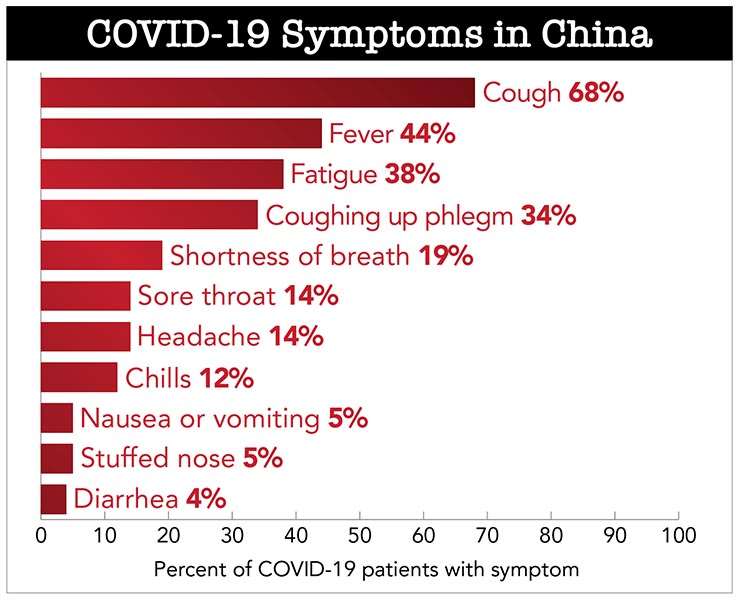5 things to know about the coronavirus

1. The virus dies off rapidly on surfaces.
In one study, some virus survived for:
- 3 days on stainless steel or plastic
- 1 day on cardboard
- 4 hours on copper
But the virus dies off quickly. Only 1/1,000 of the initial virus load was left by day 2 on stainless steel and by day 3 on plastic. Half was gone after 6 to 7 hours on those two surfaces.
How much is enough to make you sick? It’s not clear. But less virus means less risk. So don’t worry about days-long contamination.
Ditto after shopping or unpacking food deliveries.
“Because of poor survivability of these coronaviruses on surfaces, there is likely very low risk of spread from food products or packaging,” says the Centers for Disease Control and Prevention.
To play it safe, wash your hands with soap and water, so any surviving virus never reaches your eyes, nose, or mouth.
2. Know the symptoms.
Worried that your headache or stuffed nose are COVID-19 symptoms?

Among 1,099 hospitalized patients in China, the most common symptoms were coughing and fever.
Though 44 percent of patients had a fever when they entered the hospital, 89 percent eventually developed one.
And many fevers weren’t high. Half (56 percent) were under 99.5ºF when patients reached the hospital. Only 4 percent of fevers were over 102ºF.
In late March, researchers at King’s College London reported a new symptom after analyzing data on 1.5 million people who used its COVID Symptom Tracker app.
Of the 1,702 people who said they had been tested for the virus, nearly 60 percent of those who tested positive—but only 18 percent of those who tested negative—reported losing their sense of smell and taste. (The loss seems to be temporary.) But the data—they’re not yet peer reviewed—are still preliminary.
Of course, many people who get tested for COVID-19 don’t have the virus, even though they have symptoms.
3. You could be contagious before you know it.
Symptoms typically appear 4 to 7 days after you’re exposed, but it could take anywhere from 2 to 14 days.
However, some people are contagious before they get symptoms. In fact, some patients never get symptoms at all.
So you may feel fine but still be spreading germs. That’s why social distancing is crucial.
4. Don’t worry about catching the virus from food.
Keep eating those fruits and vegetables. (As always, wash them under running water first.) So far, outbreaks have been traced to contact with other people, not to eating contaminated food. That makes sense. This virus causes severe illness by infecting the respiratory tract, not the gut.
5. No foods or supplements can ward off the virus.
Heard that this or that food or supplement can boost immunity to the coronavirus? Ignore it.
Virtually every nutrient is essential for a healthy immune system. So just about any vitamin label can claim to “support” or “enhance” immunity.
But unless you’re truly deficient in a vitamin or mineral—unlikely for most Americans—there’s little compelling evidence that taking more helps.
Ditto for non-vitamin supplements. If a miracle cure or immune booster is found, you’ll hear about it from the CDC, not a supplement seller.
Over the long run, a healthy diet—rich in vegetables, fruits, beans, nuts, and whole grains and low in sweets and red meats—can help lower the risk of heart disease, type 2 diabetes, and high blood pressure. Having any of those raises the odds that the virus causes a more severe illness.
But no single food can fire up your immune system.
Photo: U.S. Department of State. Graph: Adapted from N. Engl. J. Med. 2020. doi:10.1056/NEJMoa2002032.

